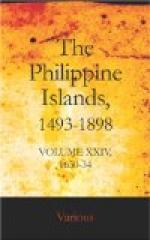They were equally opposed. One adito, father Fray Antonio de Porras, was not there. Each side put forth its efforts, working for our Lord’s service, at which all aimed, doubtless, but by different paths. The father commissary took sides with the party of our father master, Fray Diego de Guevara, as he thought that the better and more justifiable. And thus this chapter disposed of all that it had proposed. Five houses in Bisayas were left with votes, namely, Santisimo Nombre do Jesus, Panay, Barbaran, Passi, and Octong. Another five votes were left in Ilocos, namely, Bantay, Ilagua, Batac, Nalbacan, and Bauang. Thus twelve votes were taken away from the province of Bisayas, which has sixteen large convents, leaving the vicars, immediate to the chapter, with the authority and power in temporal and spiritual matters, as if they were priors. Only their vote in the chapter was taken away. Of the thirteen convents in the province of Ilocos, eight were deprived of vote. In the province of Tagalos, votes were assigned to the house of Manila, that of Guadalupe, the father sub-prior, the father preacher-general, the convent of Taal, that of San Pablo de los Montes, the convent of Bay, that of Pasig, those of Paranaque, Tondo, Bulacan, Malolos, Agonoy, and Calumpit—in all, fourteen votes. Many houses—about ten—were deprived of votes; and of these sometimes they make priorates (or rather, vicariates) and sometimes visitas. Six votes were given to Pampanga, namely, Bacolor, Mexico, Guagua, Macabebe, Lubao, and Candaba. Six other convents were left as vicariates. Thus the houses having vote numbered twenty-eight. The subprior and procurator-general, four definitors, two visitors, the discreto of Manila, the provincia and his associate bring the number up by ten [sic], and make thirty-nine; and the absolute provincial bring it up to forty.
It was declared that when, through the privations of the time, any convent should decrease notably, the definitorio could transfer its vote in that chapter to another convent, as might then seem advisable, as was seen in the convent of Aclan. When this convent passed from the order its vote was transferred to the convent of Barbaran.




